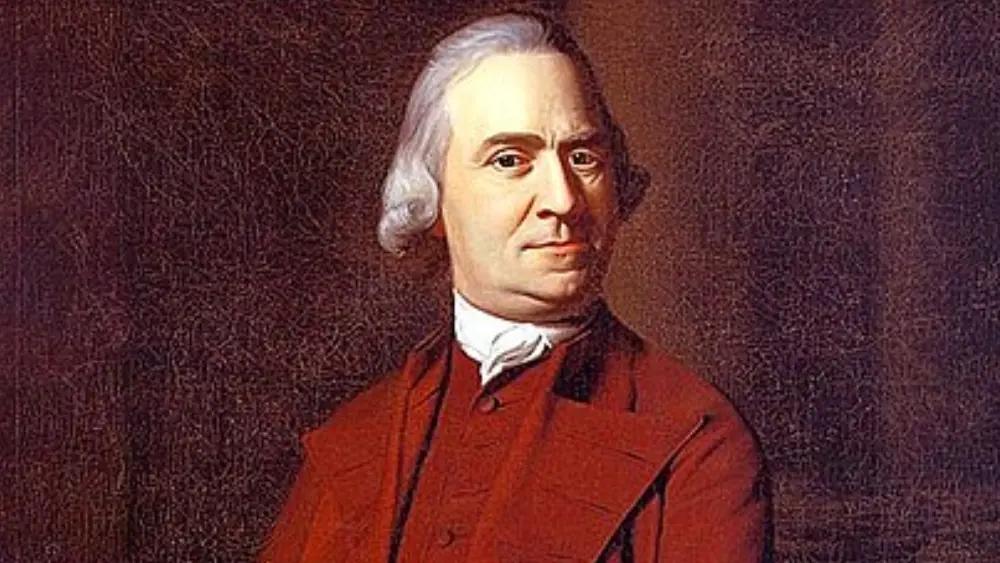Samuel Adams, born on September 16, 1722, in Boston, Massachusetts, is a celebrated figure in American history. He is often referred to as the “Father of American Independence” for his influential role in fomenting resistance to British colonial rule and his contributions to the American Revolution.
Early Life and Family Background
Samuel Adams’ early life was characterized by privilege and influence within colonial Massachusetts. Born into prosperity, Samuel Adams Sr. was a successful brewer and a respected figure in Boston’s Congregational Church. Samuel’s upbringing in an affluent and morally grounded family shaped his future, blending financial stability with strong values.
Samuel Adams, raised in an environment fostering intellectual exploration, engaged in discussions of civic responsibility while growing up. Within his family, Samuel Adams cultivated a deep commitment to community duty and dedication to liberty principles. His formative years in colonial Massachusetts would lay the foundation for his later involvement in the revolutionary cause, as he drew upon the values instilled in him during his upbringing to become a leading figure in the American Revolution and an advocate for the rights and freedoms of the American colonists.
Samuel Adams: Education and Early Career
Samuel Adams’ post-graduate journey commenced after his graduation from Harvard College in 1740. Initially, Samuel worked briefly in his family’s prosperous brewery, following a familiar career path before his revolutionary pursuits. His interests soon led him to politics and public service, diverging from the family’s brewery business path he initially followed. This pivotal shift marked a turning point, as he developed an ardent commitment to colonial self-determination and the revolutionary cause.
In the early stages of his career, Samuel Adams took on various roles, including that of a tax collector. His initial role seemed odd for a revolutionary icon, but it offered a unique view of the colonists’ struggles. Initially hesitant, this invaluable experience deepened his understanding of British colonial injustices and paved his path to an influential Revolutionary role. Samuel Adams’ early career and education laid the foundation for his passionate advocacy for American colonists’ rights and liberties.
The Boston Massacre and Activism
Samuel Adams’ political involvement in Massachusetts and the colonies expanded as he became deeply entrenched, increasing his activism and influence. A vocal critic of British taxes, he rose as a prominent figure in the growing dissent against British rule. A career turning point was his role in publicizing the 1770 Boston Massacre, which greatly impacted his influence and legacy. Adams leveraged his formidable skills as a writer and orator to disseminate information and provoke public outrage over the incident. His passionate writings and speeches galvanized colonial sentiment against British oppression, significantly fueling the growing revolutionary spirit.
Samuel Adams’ role as a catalyst for change did not stop at merely inciting public sentiment. His tireless advocacy for colonial rights and liberties laid the groundwork for the American Revolution. Adams, through activism, sowed rebellion’s seeds, nurturing colonists’ resolve against British tyranny and leading to the fight for independence. His enduring legacy showcases the profound impact of passionate individuals in shaping history during times of societal transformation.
Samuel Adams: The Committees of Correspondence
Samuel Adams’ enduring legacy in the pre-Revolution era includes his pivotal role in founding the Committees of Correspondence. These committees were a visionary innovation that became a critical instrument of colonial unity and resistance. Conceived by Adams in 1772, they served as a vital network of communication among the American colonies at a time when timely and accurate information was paramount.
The Committees of Correspondence were not merely conduits for information; they were the lifeblood of revolutionary coordination. They played a central role in disseminating news about British actions and injustices, helping to galvanize public sentiment against colonial oppression. These committees also facilitated the exchange of ideas and strategies among the colonies, fostering a sense of unity that would be instrumental in the coming struggle for independence. Samuel Adams’ foresight in establishing these committees underscored his commitment to the cause of liberty and his shrewd understanding of the power of organized communication in the fight for colonial rights and self-determination.
The Boston Tea Party
Samuel Adams’ name is forever intertwined with one of the most legendary acts of protest in American history: the Boston Tea Party of 1773. At the heart of this momentous event, Adams and his fellow members of the Sons of Liberty orchestrated a bold act of civil disobedience that sent shockwaves through the American colonies and the British Empire. Disguised as Native Americans to conceal their identities, colonists boarded British ships and defiantly tossed crates of tea into Boston Harbor. This audacious act was a resounding declaration of opposition to British taxation without representation, a deeply ingrained grievance that had festered for years.
The Boston Tea Party not only symbolized the resolve of the American colonists but also represented a turning point in the prelude to the American Revolution. Samuel Adams’ leadership and commitment to the cause of colonial rights played a crucial role in organizing this act of protest and in shaping the revolutionary fervor that would eventually lead to the Declaration of Independence and the birth of a new nation. The Boston Tea Party remains an enduring testament to the determination of individuals like Adams to stand up against injustice and fight for the principles of liberty and self-determination.
Samuel Adams: Continental Congress and the Declaration of Independence
Samuel Adams emerged as a central figure in the quest for American independence from British rule. As a delegate to the Continental Congress, he played a pivotal role in articulating and championing the cause of colonial autonomy. His impassioned advocacy for independence resonated strongly within the Congress and beyond. In a historic moment that would shape the course of history, Adams put his name on the Declaration of Independence in 1776, signaling his commitment to the ideals of liberty and self-determination.
Adams’ dedication to the revolutionary cause didn’t end with the signing of the Declaration of Independence. He continued to serve in the Continental Congress throughout the arduous years of the Revolutionary War. His leadership and tireless efforts bolstered the resolve of the American colonies, helping to sustain the fight for freedom. Samuel Adams’ contributions to the early American nation extended far beyond his signature on a document; they represented a steadfast commitment to the principles of independence and a legacy that continues to inspire generations of Americans.

Post-Revolutionary Years and Legacy
After the war, Samuel Adams returned to Massachusetts and became involved in state politics. He served as governor of Massachusetts and was a key figure in the drafting of the state’s constitution. Adams’ commitment to the principles of liberty, limited government, and individual rights was unwavering. His dedication made a lasting impact on the nation.




